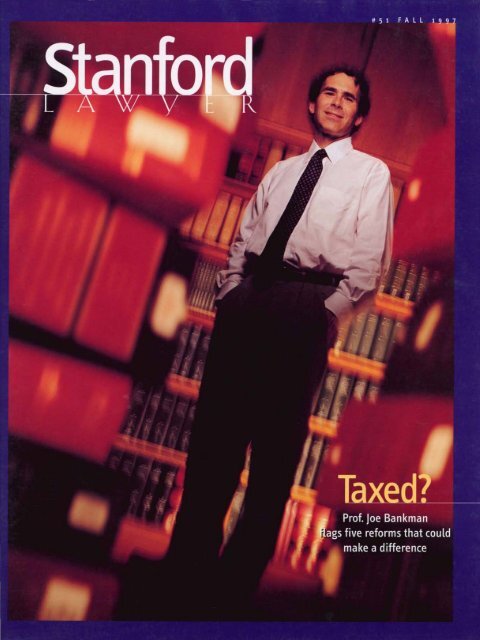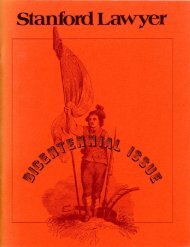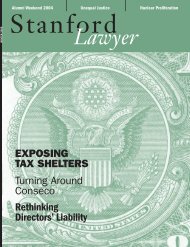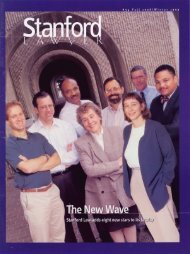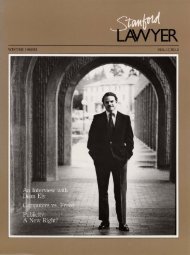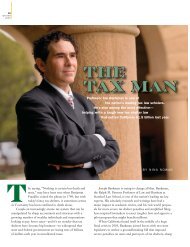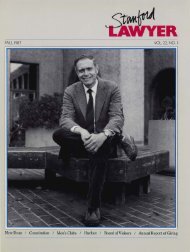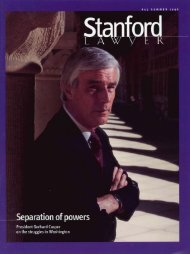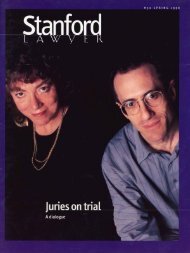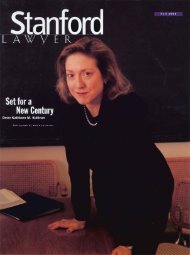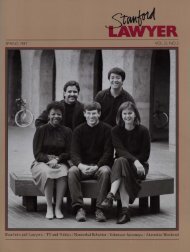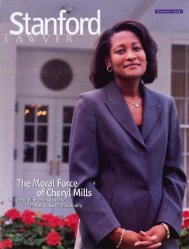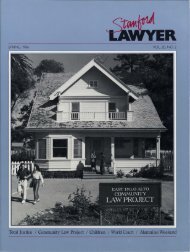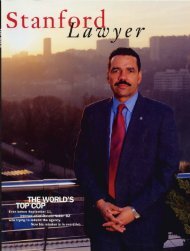Fall 1997 – Issue 51 - Stanford Lawyer - Stanford University
Fall 1997 – Issue 51 - Stanford Lawyer - Stanford University
Fall 1997 – Issue 51 - Stanford Lawyer - Stanford University
Create successful ePaper yourself
Turn your PDF publications into a flip-book with our unique Google optimized e-Paper software.
----------<br />
~LL POLITICIANS, SENATOR STANFORD<br />
OFTEN TOOK A BEATING IN THE PRESS.<br />
BUT WHEN HE SAID HE WOULD BEOUEATH<br />
$20 MILLION TO FOUND A UNIVERSITY IN LOVING<br />
MEMORY OF HIS SON, THINGS GOT REALLY NASTY.<br />
And the reporter wasn't<br />
finished. ({ ... we hope that<br />
Senator <strong>Stanford</strong> will burn the<br />
I·A~·~"rc~:nts~a:;;~~~·~~t;ealth oan ~niy<br />
be used to erect an empty ehell aiid to comt<br />
memorato a 'rich man'. Collv_ -<br />
. _. ·,t VI'''' exoect r..,.<br />
The New York Commercial Advertiser,<br />
on Senator <strong>Stanford</strong>'sfoundinggiji of$20 million.<br />
. i<br />
will....To create a great university Aladdin-<br />
like out of money is as useless as<br />
would be the building of an<br />
institution for the relief of<br />
destitute ship-captains in<br />
the mountains of Switzerland."<br />
Of course, history has proven the writer<br />
dreadfully wrong. The university flourished,<br />
in large part because of bequests and other<br />
planned gifts from thousands who followed<br />
Jane and Leland <strong>Stanford</strong>'s example.<br />
But still, the reaction to Senator <strong>Stanford</strong>'s<br />
original bequest raises a point. That, no matter<br />
support the school you love can sometimes<br />
seem like a daunting process.<br />
We're here to make sure that it isn't.<br />
The Office of Planned Giving can help<br />
you with everything from simple bequests to<br />
charitable remainder trusts.<br />
Our staff of attorneys can<br />
prepare draft language for<br />
a will or trust, analyze tax<br />
77Je Office ofPlanned Giving<br />
can help guideyou and ellSure<br />
your 'luis/us are honored.<br />
implications of various gift options, and answer<br />
any questions you or your advisors might have.<br />
Call us at (800) 227-8977 ext. 54358, or write us<br />
how noble the intention, giving money to at 301 Encina Hall, <strong>Stanford</strong>, CA 94305.<br />
STA:-":FOHI><br />
()FFI(;E ()F<br />
PL;'.:'lNEI><br />
(; I v I N (;
,Nf()IID LAWYER<br />
The name's the same-<strong>Stanford</strong> Lawyef-and so are<br />
the ever-popular class notes. What's new is the reader-friendly format and focus.<br />
Let us know what you think.<br />
otice anything new We hope so. <strong>Stanford</strong> <strong>Lawyer</strong>, now 30 years and 50<br />
197 0<br />
issues old, has been renovated from the ground up, with the needs and<br />
wants of today's alumni firmly in mind.<br />
Recognizing that you're a busy person, we are focusing on news that you can use and<br />
are unlikely to get elsewhere. And we've put the news up front where you can readily find it.<br />
To save you time, we've also shortened and condensed our articles. Those who want to<br />
delve more deeply will find telephone, Internet, and other "links" flagged by CD (for information).<br />
Think-resource guide.<br />
Our recent alumni survey confirmed the conventional wisdom: Class notes are by far<br />
1 9 8 1<br />
the most popular feature. You'll be glad to know that we continue to publish the most<br />
comprehensive alumni notes in the law school world.<br />
Survey respondents also said they would like to receive the magazine more often. We<br />
hereby pledge to pick up the pace, with a goal of three (rather than two) issues a year.<br />
Finally, recognizing that the magazine had begun to look a bit stale, we have freshened<br />
our design and layout.<br />
We welcome your reactions and comments. Please address them to editor Constance<br />
Hellyer: e-mail chellyer@stanford.edu; telephone 650/723-3019; fax 650/725-0253; or write the<br />
1 9 9 6<br />
Communications Office, Crown Quadrangle, <strong>Stanford</strong> Law School, <strong>Stanford</strong>, CA<br />
94305-8610. ~<br />
STANFORD lAWYlR 0
<strong>Stanford</strong> Law School<br />
Generallnfonnation<br />
(650) 723-2465<br />
Law. Information@forsythe.stanford.edu<br />
Administration<br />
(650) 723-2742<br />
Law.Administration@forsythe.<br />
stanford. edu<br />
Admissions<br />
(650) 723-4985<br />
Law.Admissions@forsythe.stanford.edu<br />
Alumni Publications<br />
(650) 723-9301<br />
Law. Alum. Pubs@forsythe.stanford.edu<br />
Alumni Relations<br />
(650) 723-2730<br />
Law. Alumni. Relations@forsythe.<br />
stanford.edu<br />
Career Services<br />
(650) 723-3924<br />
Law. Career. Services@forsythe.<br />
stanford.edu<br />
Continuing Legal Education<br />
(650) 723-5905<br />
Law CLE@forsythe.stanford.edu<br />
Dean's Office<br />
(650) 723-4455<br />
Law. SchooIDean@forsythe.stanford.edu<br />
Development<br />
(650) 723-9504<br />
Law. Development@forsythe.stanford.edu<br />
Faculty Affairs<br />
(650) 723-3960<br />
Law. Faculty .Affairs@forsythe.stanford.edu<br />
Family Advocacy and Support Program<br />
(650) 725-9418<br />
martham@leland.stanford.edu<br />
Financial Aid<br />
(650) 723-9247<br />
Law. Financial.Aid@forsythe.stanford.edu<br />
Law and Business Program<br />
(650) 725-0802<br />
perino@leland.stanford.edu<br />
Law and Technology Policy Center<br />
(650) 725-7788<br />
ceh@leland.stanford.edu<br />
Law Fund<br />
(650) 725-8115<br />
Law. Fund@forsythe.stanford.edu<br />
Robert Crown Law Library<br />
(650) 723-2477<br />
Law.Library@forsythe.stanford.edu<br />
Natural and Environmental Resources<br />
Law Program<br />
(650) 723-4057<br />
megC©leland.stanford.edu<br />
John M. Olin Program<br />
in Law and Economics<br />
(650) 723-2575<br />
olin-kramer@leland.stanford.edu<br />
Public Interest Law Programs<br />
(650) 725-4192<br />
tneLson@leland.stanford.edu<br />
Registrar<br />
(650) 723-3430<br />
Law. Registrar@forsythe .stanford. edu<br />
Room scheduling<br />
(650) 723-2692<br />
lohn.Mendoza@forsythe.stanford.edu<br />
<strong>Stanford</strong> Center on Conflict and<br />
Negotiation<br />
(650) 723-9480<br />
jxs@leland.stanford.edu<br />
<strong>Stanford</strong> Program in International<br />
Legal Studies<br />
(650) 723-2978<br />
Kate. DeBoer@forsythe.stanford.edu<br />
Student Affairs<br />
(650) 723-4522<br />
Law. Student.Affairs@forsythe.<br />
stanford.edu<br />
Law School Web Site<br />
http://www-leland.stanford.edu/<br />
group/law/<br />
#<strong>51</strong> (Vol. 32, No.1)<br />
<strong>Fall</strong> <strong>1997</strong><br />
DEAN<br />
Paul Brest<br />
Richard E. Lang Professor of Law<br />
and Dean<br />
ASSOCIATE DEAN<br />
EXTERNAL RELATIONS<br />
Susan S. Bell<br />
COMMUNICATIONS DIRECTOR<br />
Ann Dethl fsen<br />
EDITOR<br />
Constance Hellyer<br />
ART DIRECTOR<br />
Andrew Danish<br />
CONTRIBUTING EDITORS<br />
Deborah Fife, John Boykin<br />
EDITORIAL INTERNS<br />
Jamal Morris (JD '98)<br />
Michael Finney (AB '00)<br />
PRODUCTION ARTISTS<br />
Dianna Henderson, Joanna McClean<br />
STANFORD LAWYER (I SN 0585-0576)<br />
is published for alumni and friends of<br />
<strong>Stanford</strong> Law School. Correspondence and<br />
information should be sent to:<br />
Editor, <strong>Stanford</strong> <strong>Lawyer</strong>, tanford Law<br />
School, <strong>Stanford</strong>, A 94305-8610.<br />
E-mail: Law.Alum.Pllbs@forsythe.<br />
sranford.edu<br />
Copyright <strong>1997</strong> by the Board ofTrustees<br />
of Leland <strong>Stanford</strong> Junior <strong>University</strong>.<br />
Reproduction in whole or in part,<br />
without permi sion of the publisher,<br />
is prohibited.<br />
STANFORD LAWYER is listed in:<br />
Dialog's Legal Resource Index;<br />
and Current Law Index and LegalTrac<br />
(1980-94). <strong>Issue</strong>s of the magazine since 1966<br />
are available on microfiche through<br />
William S. Hein & Co., Inc., 1285 Main treet,<br />
Buffalo, NY 14209-1987.<br />
Printed by Alonzo Printing in Hayward,<br />
California. Alonzo Printing is a Ilnion shop that<br />
pnnts exclusively on recycled and tree- free papers<br />
using soy-based inks.<br />
8 FAI L <strong>1997</strong>
ISS U E 5 I, F ALL I 9 9 7<br />
14<br />
Tax Reform<br />
Five sensible ways to lighten the taxpayer's burden.<br />
You mighr never have to file again.<br />
by Professor Joseph L. Bankman<br />
18<br />
Professors in Print<br />
Some excerpts and a comprehensive bibliography.<br />
Compiled by Erika Wayne<br />
_____ILLP ART ~,-,-T~S",-----__<br />
5<br />
News Briefs<br />
Introducing your quickest source on securities fraud<br />
litigation. This and other news of the School, and how you can<br />
enjoy its resources and activities.<br />
23<br />
Classmates & Sidebars<br />
Fifty-plus class columns, with sidebars on:<br />
a travel maven ... 31<br />
big-city police commissioner 33<br />
stereotype-defying Republican 39<br />
defender of privacy 47<br />
storefront educator <strong>51</strong><br />
twenty-something dean 53<br />
__C 0 V -.E _"- _<br />
Professor Joseph Bankman<br />
ponders our imposing tax system and<br />
suggests some reforms.<br />
Phowgraph by Richard Morgenstein<br />
59<br />
In Memoriam<br />
60<br />
Law Gatherings<br />
64<br />
Coming Events
j.Mul"~<br />
~- ,~• I<br />
~.. h<br />
"My personal and<br />
professional world<br />
was broadened more<br />
by this fellowship<br />
year than by any<br />
other educational<br />
. .<br />
expenenceln<br />
my life."<br />
TOM JOHNSON,<br />
President, CNN<br />
White House Fellow 1965-66<br />
"What I learned about<br />
government as a White<br />
House Fellow was the key<br />
to the opportunities that<br />
came my way. "<br />
GEN. COLIN POWELL,<br />
former Chairman of the Joint Chiefs of Staff<br />
White House Fellow 1972-73<br />
Become a White House Fellow<br />
Since 1965, the White House Fellowships have offered a select group of<br />
outstanding men and women a year-long opportunity to participate in<br />
government at the highest levels. Between 11 to 19 Fellows are chosen each<br />
year to serve as full-time, paid assistants to Cabinet secretaries, executive<br />
branch agency heads and senior White House staff. The nearly 500 alumni<br />
of the program have gone on to become leaders in all fields of endeavor,<br />
fulfilling the fellowship's mission to encourage active citizen hip and<br />
service to the nation.<br />
"The opportunity to<br />
learn about varying<br />
leadership styles as well<br />
as understand how our<br />
government and our<br />
military function has<br />
greatly enhanced my<br />
capability to be a<br />
corporate leader."<br />
PAULA H. CHOLMONDELEY,<br />
Vice President, General Manager,<br />
Division of Owens·Coming<br />
White House Fellow 1982-83<br />
SELECTION CRITERIA<br />
• Applicants must be U.S. citizens.<br />
• Employees of the federal government are not eligible unless they are<br />
career military personnel.<br />
• Applicants should be out of school and working in their chosen professions.<br />
• Applicants are expected to have a record of remarkable achievement<br />
early in their careers; the skills required to serve at the highest levels of<br />
government; the potential to be leaders in their professions; and a proven<br />
commitment to public service.<br />
• Fellowships are awarded on a strict non-partisan basis.<br />
FOR MORE INFORMATION<br />
Contact the President's Commission on White House Fellowships:<br />
712Jackson Place, NW,<br />
Washington, DC 20503.<br />
Telephone: (202) 395-4522<br />
Facsimile: (202) 395-6179<br />
Web: http://www.whitehouse.gov/wh_fellows
Mann assists<br />
Supreme Court<br />
Some $1.4 billion in<br />
escrow d oil lease<br />
revenues hung in the<br />
balance as the U.S.<br />
Supr me ourt conidered<br />
the report of<br />
J. Keith Mann, Special<br />
Ma ter in a longrunning<br />
territorial<br />
disput between the<br />
United States and<br />
the State of Alaska.<br />
Also at stake was the<br />
seaward reach of the<br />
Arctic National<br />
Wildlife Refuge. Prof.<br />
Mann's 565-page<br />
report provided a<br />
compr hensive study<br />
of the legal ownership<br />
of the submerged<br />
land.<br />
n June 19 the<br />
Court, with Justice<br />
Sandra Day O'Connor<br />
'52 writing the<br />
opinion, accepted<br />
Mann' award of the<br />
territory off the<br />
National Petroleum<br />
Reserv to the .., as<br />
well a his boundary<br />
off Prudhoe Bay. A<br />
majority of the Court<br />
went further by also<br />
FA<br />
ULTV<br />
Professors in the news<br />
&on the air<br />
denying Ala ka the<br />
lagoon off the Wildlife<br />
Refuge.<br />
CD See Report ofthe<br />
Special Master. U.s. v.<br />
Alaska, U.S. Supreme<br />
Court. October Term,<br />
1995. No. 84 (Original).<br />
Also: Linda Greenhouse,<br />
"Justices Back U.S. in<br />
Dispute with Alaska over<br />
Coastal Areas." New<br />
York Times. June 20. <strong>1997</strong>.<br />
Sullivan writes<br />
new "Federalist<br />
Papers"<br />
KathIe n M. ullivan<br />
is one of three noted<br />
scholar tapped by the<br />
Twentieth entury<br />
Fund to write ew<br />
Federalist Papers:<br />
Essays in Defense ofthe<br />
Constitution. The<br />
other auth rs are<br />
historian Alan Brinkley<br />
ofColumbia and<br />
politi al scientist<br />
Nelson W. Potsby of<br />
UC-Berkeley. These<br />
modern essay , like<br />
the originals, explore<br />
the underlying principles<br />
of our founding<br />
document. They also<br />
appeared individually<br />
in the press before<br />
being published in<br />
book form.<br />
Prof. Sullivan<br />
expand d the discourse<br />
to televi ion by<br />
moderating a Fred<br />
Friendly Seminar,<br />
Liberty and Limits:<br />
The Federalist Idea<br />
200 Years Later. Her<br />
pr gram, released by<br />
PBS on April II, was<br />
call d "The Price f<br />
Politics: Electing Our<br />
Leaders."<br />
A seasoned mel 1b r<br />
of the Supreme Court<br />
bar, Sullivan is Widely<br />
known for h r lucid<br />
commentary on Nightline<br />
and the NewsHour<br />
with Jim Lehrer. At<br />
<strong>Stanford</strong>, she is the<br />
inaugural Stanley<br />
Morrison Profe sor<br />
and winner of the<br />
1996 Hurlbut Award<br />
for Exc lIence in<br />
Teaching.<br />
increasingly diverse PBS documentary Jeff Strnad Klausner's work is<br />
communications entitled "Crime and Finance and tax grounded in joint MA<br />
industry. Punishment in (economics) and JD<br />
CD See R.Lowenstein, America." Released in Strnad is one of the degrees from Yale<br />
"Antitrust Enforcers Drop January, the special nation's leading (1981); a Supreme<br />
the Ideology, Focus on included on-camera scholars in the Court clerk hip with<br />
Economics," Wall Street commentary by the growing field of Justice William Bren-<br />
JournaL February 27, <strong>1997</strong>. School's Marion Rice law and economics. nan; practice with<br />
Kirkwood Professor. He earned his AB in Paul, Weiss, Rifkind,<br />
CD Videotape (#CPIA901): physics from Harvard Wharton & Garrison<br />
Gunther<br />
1-800/344-3337. (1975) and both a JD and later Gibson,<br />
speech shown<br />
(1979) and a PhD in Dunn & Crutcher;<br />
Division, returned to<br />
nationwide<br />
economics (1982) and a year (1989-90)<br />
the OOJ in October to Gerald Gunther<br />
New<br />
from Yale. as a White House<br />
receive its prestigious garnered another Strnad comes to Fellow and Deputy<br />
John Sherman Award honor as Morrison<br />
faces of<br />
<strong>Stanford</strong> with 17 Associate Director of<br />
and commemorate the Lecturer for the 1996 years' experience the Office of Policy<br />
prosecution and settle- convention of the <strong>1997</strong> chiefly and conjointly Development.<br />
ment of U.S. v. California State at the <strong>University</strong> of Also acquainted<br />
American Telephone Bar. The emeritus Arriving professors Southern alifornia with Chinese law and<br />
&Telegraph Company. William Nelson expand business law Law Center and the business, Klausner<br />
Baxter's predecessor, Cromwell Professor program California Institute of spent a year in Gib-<br />
Thomas Kauper of the must have given quite Emboldened by the Technology. He was son Dunn's Hong<br />
<strong>University</strong> of Michi- a speech, because C-<br />
gan, was similarly Span broadcast it<br />
honored. Attorney January 25 on its<br />
General Janet Reno America and the Courts<br />
joined then-Antitrust program.<br />
chief Anne K. Binga- CD Videotape (#75878):<br />
man '68 in celebrating 1-800/2n-2698.<br />
KLAUSNER<br />
CO LE<br />
progress of the named in 1989 to Kong office and<br />
current fundraising USC's Milliken pro- another year as a<br />
campaign, the fessorship in taxation; visiting scholar and<br />
School has begun at Caltech he was pro- lecturer at Peking<br />
to rebuild the fessor of law and <strong>University</strong>.<br />
faculty. economics. Klausner's main<br />
This fall brings Strnad's contri- teaching areas will be<br />
three new profes ors: butions to the Stan- business associations<br />
two recruited from ford curriculum and regulation of<br />
other faculties and will be in finance financial institutions.<br />
one from law firm<br />
and tax law-the focus<br />
practice. All three also of his consider- G. Marcus Cole<br />
will teach in the able research and Contracts and<br />
areas of business and scholarship. bankruptcy<br />
economics.<br />
"Added to our Michael Klausner Cole is entering acathe<br />
two history- Friedman book existing faculty, these orporations and banks demia with law firm<br />
making academics. sparks TV newcomers will give experience in bank-<br />
Baxter, who is now speciaL<br />
<strong>Stanford</strong> a business Klausner is a highly ruptcy, commercial,<br />
William Benjamin curriculum second to regarded young scholar and ecclesiastical law.<br />
Scott and Luna M. Lawrence Friedman's none in the country," in corporate law. He His practice has been<br />
Scott Professor, Emeri- Crime and Punishment says a pleased Dean began teaching in 1991 with Mayer, Brown &<br />
tus, continues to work in American History Brest. at New York Univer- Platt of Chicago.<br />
on behalf of compe- (Basic Books, 1993) Here are the sity, which awarded Cole i a graduate<br />
tition in the inspired a two-hour new professors: him tenure in 1995. of{"'ornell, where he
earned a BS in applied Two of the five those of the professor Council of Economic served as president of<br />
econ mics (1989), and appointments involve destined to be the in- Advisers in the Office the Association of<br />
ofNorthwestern Law new chairs created by augural chairholder. of the President American Law<br />
School 00,1993), gifts to the ongoing Babcock has, in (1984-85) and then Schools' Tax Section<br />
where he was editor- Campaign for Stan- addition to leading the as a commissioner on and coauthored two<br />
in-chief of the North- ford Law School. The U.S. Justice Depart- the Securities and Ex- books entitled Federal<br />
westem]oumalof other three represent ment's Civil Division change Commission Income Taxation: the<br />
International Law the succession of a (1977-79), headed the (1985-90). 11 th edition of a<br />
and Business. In law new generation of Washington, D.C., The new pro- classic casebook and a<br />
school he also served scholars into public defender ser- fessorship was estab- volume of examples<br />
as teaching assistant established chairs. vice and authored a lished this spring by and explanations<br />
for a torts course and "Endowed profes- text on civil proce- gifts from W. A. (both Little, Brown,<br />
as a member of the sorships," says Dean dure. She continues to (Bill) Franke '61, <strong>1997</strong>).<br />
school's national Brest, "undergird our speak out eloquently chairman and CEO of Bankman came to<br />
Frederick Douglass teaching and research in defense of the jury America West, and <strong>Stanford</strong> in 1989 from<br />
Moot Court Team. efforts and strengthen system and on other George Roberts, the <strong>University</strong> of<br />
A clerkship with Judge the bonds between litigation issues. founding partner of Southern California<br />
Morris Sheppard prized professors and
courses related to<br />
bank and thrift institution<br />
regulation.<br />
The Parsons<br />
professorship was<br />
established in 1980<br />
to strengthen the<br />
School's law and<br />
business program and<br />
to honor Ralph M.<br />
Parsons, founder of<br />
the international<br />
engineering and<br />
construction<br />
company that bears<br />
his name.<br />
CD Bankman:<br />
http://www-leland.<br />
stanford.edu/group/<br />
law/faculty/bankman.<br />
htm<br />
Thomas C. Heller<br />
Lewis Talbot and<br />
Nadine Hea11l Shelton<br />
Professor of International<br />
Legal "tttdies<br />
Thomas Heller is at<br />
the forefront of efforts<br />
to break the international<br />
impasse over<br />
global warming. Also<br />
an expert on international<br />
law and<br />
economics, he has<br />
been consulting on<br />
climate change issues<br />
with the World<br />
Business Council for<br />
Sustainable Development.<br />
The widely<br />
traveled professor<br />
helped found and<br />
currently codirects<br />
the postgraduate<br />
<strong>Stanford</strong> Program in<br />
International Legal<br />
Studies (SPILS). He is<br />
also a senior fellow of<br />
the <strong>Stanford</strong> Institute<br />
for International<br />
Studies and a former<br />
director of <strong>Stanford</strong>'s<br />
Overseas Studies<br />
Program.<br />
The Shelton<br />
profe sorship wa<br />
created in 1972 with<br />
gifts from Talbot<br />
Shelton (AB '37) and<br />
funds from the Ford<br />
Foundation to support<br />
international studies.<br />
The previous holder,<br />
Mauro Cappelletti, is<br />
now emeritus.<br />
CD Press release:<br />
http://www-leland/<br />
dept/news/relaged/<br />
970106heller.html.<br />
Heller: http://wwwleland.stanford.edu/<br />
group/law/faculty/<br />
heller.htm.<br />
SPllS: 650/723-2978;<br />
or e-mail spils@<br />
forsythe.stanford.edu<br />
Deborah L Rhode<br />
Emest W. Mc<strong>Fall</strong>and<br />
PlOfessor of Law<br />
Deborah Rhode has<br />
been appointed to a<br />
professorship created<br />
by andllamed for a<br />
devoted public<br />
servant and alumnus.<br />
Ernest McFarland '22<br />
was a U.S. senator<br />
(1941-52) and<br />
majority leader<br />
(19<strong>51</strong>-52), governor<br />
of Arizona (1955-59),<br />
and a state supreme<br />
court ju tice (1965<br />
71) and state chief<br />
justice (1968-71).<br />
The mantle of<br />
McFarland Professor<br />
fits Rhode's own deep<br />
commitment to<br />
public service. Not<br />
only is she about to<br />
assume the presidency<br />
of the Association of<br />
American Law<br />
Schools (see page 5),<br />
but she is preparing to<br />
make public service<br />
and pro bono work a<br />
focus of her term.<br />
Rhode succeeds<br />
Barbara Babcock in<br />
the McFarland chair<br />
following Babcock's<br />
appointment to the<br />
new Crown professorship<br />
(se page 9).<br />
CD Rhode: http//wwwleland.stanford.edu/<br />
group/law/faculty/rhode.<br />
htm<br />
EAC U LT Y 3-C I:{QLAB..<br />
John J. Donohue III<br />
John A. Wilson<br />
Distinguished Faculty<br />
Scholar<br />
John Donohue joined<br />
the faculty in 1995 as<br />
one of the most<br />
sought-after legal<br />
scholars of his generation.<br />
Combining a<br />
Harvard JD with a<br />
Yale PhD in economics,<br />
he applies<br />
economic analysis to<br />
legal issues in corporate<br />
finance, employment<br />
discrimination,<br />
and criminal law.<br />
The fund supporting<br />
the Wilson<br />
post was established<br />
in 1996 by Alan<br />
Austin '74, his colleagues<br />
at Palo Alto's<br />
Wilson Sonsini<br />
Goodrich & Rosati,<br />
and other friends of<br />
Wilson Sonsini<br />
founding partner<br />
John A. Wilson.<br />
Faculty scholar funds<br />
like the new Wilson<br />
fund provide research<br />
support to a succession<br />
of up-and-coming<br />
faculty members.<br />
CD Campaign Brief#3<br />
(March <strong>1997</strong>). Donohue:<br />
http://www-leland.<br />
stanford.edu/group/<br />
law/faculty/donohue.<br />
htm<br />
CAMrAIC<br />
Progress on<br />
all fronts<br />
Alumni rally for expanded fundraising effort<br />
C& More than 3,000 alumni and friends<br />
of the School have so far donated to<br />
the Campaign for <strong>Stanford</strong> Law<br />
choo\. The circle of supporters<br />
continues to grow as the Campaign<br />
evolves and new leaders join the<br />
drive. Some recent highlights:<br />
Ct The initial $50-million goal for the<br />
Campaign was passed by the end of<br />
1996. Efforts are now focused on a<br />
goal of at least $75 million, which is<br />
closer to the School's true level of<br />
need.<br />
C& Warren Christopher '49, former<br />
secretary of state and presidential<br />
Medal of Freedom holder, joined the<br />
Campaign in March as co-chair.<br />
'* John Freidenrich '63, recent<br />
president of the <strong>Stanford</strong> <strong>University</strong><br />
Board of Trustees, joined the<br />
Campaign Steering Committee.<br />
tit The participation rate of <strong>Stanford</strong><br />
Law School alumni rose to 34 percent<br />
in 1995-96, the highest level in recent<br />
years. Hats off to Chuck Koob '69,<br />
outgoing Law Fund chair.<br />
G The School's newest alumni, the<br />
Class of <strong>1997</strong>, set a student-donor<br />
participation record of 69 percent and<br />
$8,593 in actual gifts. Thanks go to six<br />
farSighted alums whose matches made<br />
each student dollar worth $7 to the<br />
School.<br />
CD http://www-leland.stanford.edu/group/<br />
law/campaign/
fmrn1be<br />
ean<br />
<strong>Stanford</strong> has initiated adialogue<br />
between law school deans and law firm leaders from around the<br />
country. Here is a report on the first exchange.<br />
by Paul Brest<br />
Richard E. Lang Professor and Dean<br />
n unprecedented<br />
event<br />
took place in Washington,<br />
D.C., this past Januarya<br />
day-long conversation<br />
between the deans of leading<br />
law schools and partners of<br />
some of the nation's most<br />
prominent law firms.<br />
The idea for the January<br />
discussion grew out of my<br />
own experience as dean-<br />
10 years during which I have<br />
spent as much time with<br />
practicing lawyers as with<br />
law professors, discussing<br />
common concerns of the legal<br />
academy and practicing<br />
bar. The deans ofChicago,<br />
Harvard, and Yale readily<br />
joined <strong>Stanford</strong> in organizing<br />
a broader forum for an exchange<br />
of views on these<br />
issues.<br />
To encourage candid,<br />
face-to-face conversations,<br />
we limited the invitation list<br />
to 10 law schools and to the<br />
managing or senior partner<br />
of 25 firms. Law school attendees<br />
ultimately included<br />
the dean and a faculty member<br />
from olumbia, Georgetown,<br />
Harvard, Michigan,<br />
New York <strong>University</strong>, Pennsylvania,<br />
<strong>Stanford</strong>, Texas,<br />
Virginia, and Yale.<br />
The law firms represented<br />
major employers of<br />
the schools' graduates. <strong>Stanford</strong><br />
alumni who participated<br />
included Jim Gaither '64<br />
(Cooley Godward), John<br />
Larson '62 (Brobeck), Duane<br />
Quaini '70 (Sonnenschein),<br />
and Marsha Simms '77<br />
(Weil, Gotshal), as well as<br />
Bryant Garth '75 of the<br />
American Bar Foundation.<br />
The Ethos of the Profession<br />
The working meeting began<br />
with a wide-ranging session<br />
entitled "The Ethos of the<br />
Legal Profession Today."<br />
Dean Anthony Kronman<br />
(Yale), Professor David<br />
Luban (Maryland), Barbara<br />
Paul Robinson (Debevoise<br />
& Plimpton), and Wesley<br />
Williams (Covington &<br />
Burling) each offered their<br />
perspectives and then<br />
opened the floor for<br />
discussion.<br />
Participants cautioned<br />
against a romanticized view<br />
of the profession's past or a<br />
Panglossian view of its present<br />
status, and against the<br />
polar tendencies to be fatalistic<br />
about economic forces<br />
or to underestimate their<br />
real power.<br />
They asked how lawyers<br />
and law schools could improve<br />
the collegiality, civility,<br />
public responsibility, and<br />
personal fulfillment of law<br />
practice.<br />
They questioned<br />
whether pro bono service<br />
has declined and if so, why.<br />
They also wondered<br />
whether professional standards<br />
or regulations should<br />
do more to protect third<br />
parties and society against<br />
the abuse of power by clients<br />
and their lawyers.<br />
Some enthusiasm was<br />
expressed for the proposal<br />
that law firms adopt mission<br />
statements reflecting their<br />
particular firm cultures<br />
and values.<br />
G) FALL <strong>1997</strong>
Personal and<br />
Professional Life<br />
The second session concerned<br />
"<strong>Issue</strong>s of Personal<br />
and Profes ional Life." Sociology<br />
professor Cynthia<br />
Fuchs Epstein (City <strong>University</strong><br />
of New York) began by<br />
summarizing her study, commissioned<br />
by the Association<br />
of the Bar of the City of New<br />
York, on the status of women<br />
in large law firms. Pr fessor<br />
Epstein noted that relatively<br />
few women are partners in<br />
such firms. She then outlined<br />
some of the barriers to<br />
women's success, including<br />
the lack of strong mentors<br />
and of opportunities for<br />
networking and rainmaking,<br />
as well as the problem of<br />
balancing professional and<br />
family responsibilities.<br />
Professor David Wilkins<br />
(Harvard) followed with a<br />
discussion of why there are<br />
so few black lawyers, and<br />
especially black partners, in<br />
large law firms. Minority<br />
attorneys confront many of<br />
the same problems a<br />
women, such as the ab ence<br />
of mentors and networking<br />
opportunities, he observed.<br />
These associates may be<br />
further handicapped by fear<br />
that their mistakes will be<br />
particularly visible to their<br />
supervising partners. This<br />
can lead them to avoid<br />
challenging assignments, to<br />
be overly cautious in their<br />
work, and to choose litigation<br />
rather than corporate<br />
work-all choices with<br />
potentially career-limiting<br />
or damaging results.<br />
Following one participant's<br />
observation that<br />
women and minority lawyers<br />
are, in effect, canaries in the<br />
coal mine of the legal profession,<br />
the discussion broadened<br />
to consider various<br />
"quality of life" issues faced<br />
by all lawyers in large<br />
firms. There was<br />
general agreement<br />
that the<br />
disjunction<br />
between associates'<br />
expectations<br />
and the reality<br />
of practice<br />
contributes to<br />
dissatisfaction,<br />
and participants<br />
thought that both the expectations<br />
and the reality were<br />
in need of adjustment.<br />
Professional Education<br />
The meeting's third session,<br />
"Preparation for Practice,"<br />
featured Dean Robert Clark,<br />
Professors Todd Rakoff and<br />
David Wilkins (all of Harvard),<br />
Michael Cooper (Sullivan<br />
& Cromwell), and<br />
Donald Kempf (Kirkland &<br />
Ellis). The ensuing discussion<br />
reflected a consensus<br />
that law schools do quite<br />
well in teaching students to<br />
think like lawyers, as well as<br />
introdUcing them to substantive<br />
areas of law and to the<br />
infrastructure of the legal<br />
LISTENING<br />
TO<br />
LAW FIRMS<br />
system. Some law firm participants<br />
were pleasantly surprised<br />
to learn of efforts by<br />
law schools to integrate<br />
ethics into the mainstream<br />
curriculum.<br />
While enthusiasm was<br />
expressed for teaching some<br />
practical skills in law school,<br />
the consensus was that most<br />
such skills are best acquired<br />
during the<br />
early years of<br />
practice,<br />
through<br />
mentorship<br />
and in-firm<br />
training.<br />
Much of the<br />
discussion focused<br />
on legal<br />
writing. Practitioners<br />
informed the<br />
deans and faculty that young<br />
lawyers corne to firms with<br />
inadequate communication<br />
skills: They are unable to<br />
express themselves clearly<br />
and succinctly and do not<br />
know how to communicate<br />
to the variety of audiences<br />
that lawyers must address.<br />
Practitioners and faculty<br />
agreed that law schools<br />
should offer more advanced<br />
legal writing. (This has been<br />
an ongoing project at <strong>Stanford</strong>,<br />
which I shall report on<br />
during the corning year.)<br />
Continuing the Dialogue<br />
In a wrap-up session moderated<br />
by Chicago dean Douglas<br />
Baird '79, practitioners<br />
and academics agreed that<br />
the meeting should be<br />
repeat d, with focused<br />
discussions of the chief issues<br />
raised.<br />
Responses to a follow-up<br />
questionnaire indicated that<br />
participants found the conversation<br />
valuable. "A very<br />
constructive first step toward<br />
establishing ongoing communication"<br />
was a representative<br />
assessment. Law firm<br />
participants emphasized the<br />
value of not only "bridging<br />
the gulf between the concerns<br />
of practicing lawyers<br />
and the legal academy," but<br />
also "discussing issues in bigfirm<br />
practice with the leader<br />
ofother national law firms."<br />
Academic participants cited<br />
"very useful insights into<br />
how the top of the profession<br />
thinks about changing professional<br />
norms and economic<br />
demands."<br />
The other deans and 1<br />
are committed to continuing<br />
and deepening this valuable<br />
dialogue. ~<br />
Dean Brest welcomes input<br />
from practicing lawyers and<br />
others with comments on legal<br />
education. Call the Dean's<br />
Office at 650h23-4455 or<br />
e-mail pbrest@stanford.edu<br />
STANfORD<br />
LAWYER
__~_,,--- ..:o-~'--__'---"'"'-_--'__--'<br />
_<br />
Five sensible ways to lighten the taxpayer's burden. (You might never have to file again.)<br />
by Joseph Bankman<br />
Ralph M. Parsons Professor of Law and Business<br />
mericans have objected to taxes for longer than there has been a<br />
United States. In fact, tax resistance in colonial days was<br />
cloaked with patriotism. Times have changed, but opposition to<br />
taxation is alive not only in odd cults, but also in mainstream<br />
efforts to reform and reduce taxes in this country. Taxes remain, as the saying goes, a<br />
"hot-button issue."<br />
Nonetheless, Americans can't seem to agree on a remedy. Proposals range from a<br />
fiat tax or a consumption (VAT) tax to a further accretion ofdeductions, exemptions,<br />
and credits in the current system. Some of the ideas are economically--or at least<br />
politically-unworkable. But others are sensible and overdue.<br />
We asked Professor Bankman, coauthor of the book Federal Income Taxation,<br />
what ref07ms he would recommend. Here are his top five suggestions. -ED.<br />
o<br />
Eliminate<br />
the corporate<br />
income tax<br />
Capital arising from<br />
corporate profits is subject to<br />
an enormous hidden doublelevel<br />
tax that by any standard-liberal<br />
or conservative<br />
--does not make sense.<br />
First, the corporation pays<br />
taxes on its income; then<br />
the individual shareholders<br />
pay tax on it again when<br />
they receive dividends or<br />
sell their hares.<br />
There's a lot offuzzy<br />
thinking on this issue. When<br />
politicians reduce individual<br />
tax rates, they commonly<br />
compensate for it by<br />
increasing corporate rates at<br />
the same time. So, many tax<br />
reform proposals that might<br />
seem to be in an affluent<br />
person's self-interest-such<br />
as reductions in the tax rate<br />
on capital gains or on high<br />
wages-actually turn out to<br />
be neutral or worse, because<br />
ofoffsetting increases in<br />
the effective tax rate on<br />
corporations in which they<br />
are shareholders.<br />
More generally, our<br />
tax system is incoherent in<br />
the way it treats capital.<br />
Some forms ofcapital are<br />
taxed very heavily, while<br />
others are taxed lightly. For<br />
example, capital invested in<br />
stock and publicly traded<br />
companies is heavily taxed;<br />
investments in real estate<br />
and passive investments in<br />
certain financial instruments<br />
are taxed relatively<br />
lightly.<br />
We need a more rational<br />
system oftaxing capital. We<br />
should start by doing away<br />
with the corporate income<br />
tax. If we did that and then<br />
collected an equivalent<br />
amount ofmoney through<br />
slightly more progressive tax<br />
rates overall, we could in<br />
crease the size ofthe economic<br />
pie, with absolutely<br />
no serious change in the<br />
relative tax burdens ofhighand<br />
low-income groups.<br />
There have been many<br />
other responsible plans-put<br />
forth by Democratic and<br />
Republican administrations<br />
alike-to integrate the<br />
corporate and the individual<br />
income tax. Any ofthem<br />
would be better than the<br />
system we have now.<br />
f)<br />
Go after<br />
unreported income<br />
A lot of potential tax<br />
revenue is lost due to poor<br />
compliance with tax laws by<br />
individuals. Many successful<br />
SlANFORD ll\WYER Q
small-business owners just<br />
pocket cash. One study of<br />
general contractors indicates<br />
that on average they report<br />
just half of their income. No<br />
aggressive tax planning by<br />
any large publicly traded<br />
enterprise is as effective as<br />
simply putting cash in your<br />
pocket and not reporting it.<br />
There are many ways to<br />
get at unreported income.<br />
We could, for example,<br />
identify property purchased<br />
by people who habitually<br />
pay little or no income tax.<br />
There are political reasons<br />
why--except for suspected<br />
criminals-this isn't done;<br />
checking on property<br />
ownership smacks of Big<br />
Brother. But if the govern<br />
ment got a share ofthat<br />
unreported income, it would<br />
be an enormous boon: We<br />
could have lower rates for<br />
everyone. I think people<br />
who pay honest taxes would<br />
regard the Big Brother tradeoff<br />
differently if it were tied<br />
to, say, a 5 percent tax cutwhich<br />
it could be,<br />
overnight.<br />
We also would have a<br />
more productive society.<br />
Many people select jobs-as<br />
service providers or retailers,<br />
for example-in part<br />
because those jobs provide<br />
tax-free cash income. If all<br />
income from all occupations<br />
were subject to the same tax<br />
rate, workers would move to<br />
jobs that are the most<br />
productive to the economy.<br />
f)<br />
Weed out<br />
pointless provisions<br />
Suppose you have a<br />
vacation home that you also<br />
rent out. Is it, from a tax<br />
perspective, a vacation home<br />
or a rental! Which expenses<br />
can you deduct! And what<br />
do you do about costs like<br />
mortgage interest, property<br />
tax, or roof repairs that are<br />
not divided very neatly<br />
The answer depends in a<br />
complicated wayan how<br />
often you use the vacation<br />
home and how often you<br />
rent it out. The aim ofthe<br />
law here is laudable-to<br />
prevent taxpayers from<br />
deducting costs attributable<br />
to personal use. Unfortunately,<br />
the rule is overly<br />
complex and nearly<br />
impossible to understand<br />
and apply.<br />
This is an example of<br />
how our law, in an effort<br />
to fine-tune things, has<br />
become unbelievably<br />
complicated. No one can<br />
sort through these kinds of<br />
rules without an accountant<br />
or tax lawyer. You need only<br />
be affected by one such<br />
section to become a foe of<br />
the IRS for life.<br />
That sort oftax finetuning<br />
is a senseless strategy.<br />
It makes everyone suffer from<br />
complexity without significantly<br />
improving fairness.<br />
o<br />
Reward<br />
pension supersavers<br />
The acronym ERISA<br />
stands for Employment<br />
Retirement Income Security<br />
Act, but it is sometimes<br />
derisively referred to as<br />
Every Ridiculous Idea Since<br />
Adam. There are certainly<br />
many good parts ofERISAlike<br />
ensuring that your<br />
employer does not invest<br />
your pension money on the<br />
roulette wheels in Monte<br />
Carlo. But ERISA is<br />
extremely complex, and its<br />
tax aspects have a very weak<br />
theoretical foundation.<br />
The tax advantages for a<br />
company in having a pension<br />
plan depend on the plan<br />
being "antidiscriminatory."<br />
In this context, that term<br />
means that the plan does not<br />
discriminate on the basis of<br />
income: The janitor and the<br />
CEO both get the same<br />
percentage ofbenefit for<br />
saving toward retirement.<br />
I believe this is an<br />
irrational way either to<br />
stimulate savings or to assure<br />
lower-paid workers ofan<br />
adequate retirement.<br />
Take the janitor: He or<br />
she pays for a pension<br />
directly, in the form of<br />
payroll deductions, and/or<br />
indirectly, through a reduced<br />
overall salary. This mayan<br />
the face of it be equal<br />
treatment, but there's no<br />
doubt that a janitor suffers<br />
more from having a reduced<br />
salary than does the CEO.<br />
At the same time the<br />
CEO, who would most likely<br />
be saving anyway, gets a tax<br />
benefit for the first and<br />
every dollar saved through<br />
an IRA or an employerprovided<br />
pension plan. In<br />
his or her case, the tax<br />
benefits are not stimulating<br />
savings so much as<br />
presenting a windfall.<br />
We should eliminate the<br />
anti-discrimination<br />
requirement completely, so<br />
that there is no requirement<br />
that employers cover all<br />
employees equally.<br />
What about the janitor's<br />
retirement years! That is tied<br />
to what we do about other<br />
things, such as Social<br />
Security. If we can keep our<br />
current Social Security safety<br />
net, we may not need to<br />
require company pension<br />
programs for the average<br />
worker. If, however, we<br />
cannot afford to keep Social<br />
Security up and must<br />
paternalistically require our<br />
janitor to save, then we<br />
ought to require that all<br />
janitors and other employees<br />
save, whether or not their<br />
companies happen to have<br />
pension plans.<br />
Second, we should stop<br />
rewarding high-paid<br />
executives and other<br />
wealthy individuals for their<br />
first dollar ofsavings. Why<br />
give tax benefits to people<br />
for doing what they would<br />
do anyway We would be<br />
much better off focusing on<br />
their last dollar ofsavings.<br />
We should follow the<br />
advice ofmy former<br />
colleague, Deborah Weiss,<br />
and give tax benefits only to<br />
supersavers -people who set<br />
aside more than the usual<br />
at his or her salary level.<br />
That's a more efficient way<br />
to stimulate savings.<br />
(!!) fALL <strong>1997</strong>
o<br />
Institute<br />
automatic filing<br />
The odium attached to<br />
taxes isn't just about the<br />
money; it's about the obligatory<br />
nuisance offiling.<br />
In fact, about two-thirds<br />
of retums presently require<br />
only a few personal details<br />
and the information from<br />
two pieces ofpaper. Even so,<br />
filing can seem frightening<br />
and burdensome to someone<br />
unfamiliar with paperwork.<br />
You have to save records.<br />
You have to sit down and fill<br />
out the form. You worry<br />
about whether all the<br />
documents have come in,<br />
whether you'll finish in time,<br />
when the refund will come<br />
in,and oon.<br />
We should accelerate<br />
and expand what is now a<br />
gradual move toward<br />
electronic filing, by having<br />
employers file their<br />
employees' tax retums for<br />
them. With filing at the<br />
source, we could completely<br />
eliminate the burden of<br />
filling out tax retums for<br />
millions ofpeople. It could<br />
be the default filing method<br />
for the average person.<br />
Depending on the specific<br />
plan implemented, anywhere<br />
from 50 to 90 percent<br />
oftaxpayers could be spared.<br />
These are people with no<br />
extraordinary personal circumstances,<br />
who have<br />
straight wage income and<br />
run-of-the-mill retums. This<br />
arrangement may also work<br />
for people with certain other<br />
sources of income who consent<br />
in advance to allow<br />
their income tax to be based<br />
on infonnation that is<br />
already filed electronically<br />
with the IRS.<br />
Most people have<br />
employers who are electronically<br />
reporting to the IRS<br />
their wage statements anyway.<br />
And banks electronically<br />
report to the IRS most<br />
mortgage expense and<br />
interest income. The same<br />
IR computer that gets all<br />
this information could calculate<br />
a typical person's tax<br />
liability. You would not have<br />
any filing responsibility at<br />
all. ince you would still be<br />
subject to wage withholding,<br />
you would not even have<br />
any re ponsibility to send in<br />
a check.<br />
You would ofcourse get<br />
a copy ofall these reports,<br />
and you could always override<br />
this default method if<br />
you chose to.<br />
Automatic filing would<br />
not work for everyone. It<br />
would not be best for you if<br />
you need to take advantage<br />
of certain major deductions.<br />
Nor would it work if your<br />
employer doesn't know, for<br />
example, whether you have<br />
a disabled child or high<br />
interest on a car loan.<br />
But I believe millions of<br />
taxpayers would make the<br />
trade-off ofgiving up tax<br />
breaks for such situations in<br />
retum for being freed ofthe<br />
burden offiling a tax retum.<br />
If we could completely<br />
eliminate the aggravation of<br />
filing for the average person,<br />
a lot ofthe dissatisfaction<br />
with the tax system would<br />
go away. That would be the<br />
smartest tax reform we could<br />
make. ~<br />
Joseph Bankman is the<br />
School's new Ralph M. Parsons<br />
Professor of Law and Business<br />
(see page 9). This article is<br />
based on a February 21, <strong>1997</strong>.<br />
interview with editor Constance<br />
Hellyer and freelance writer<br />
John Boykin.<br />
Whalahou1allattax1<br />
For years tax critics<br />
have tried to<br />
balance the<br />
simplicity of a flat<br />
tax with the fairness of a<br />
graduated tax. No proposal<br />
has made much headway.<br />
The reason is that<br />
there is a fundamental<br />
conflict between a tax<br />
that's the same for<br />
everyone and a tax that<br />
takes into account<br />
characteristics like<br />
whether someone is<br />
wealthy or poor. healthy or<br />
disabled, using their<br />
money for schooling or to<br />
make a fashion statement.<br />
investing in a socially<br />
desirable way or pillaging<br />
the environment. and so<br />
on. Whenever you take<br />
factors like those into<br />
account. you get<br />
com plexity.<br />
To be sure, our current<br />
law gives us the worst of<br />
both worlds: unbelievable<br />
complexity without much<br />
perception of fairness.<br />
Various flat tax proposals<br />
are often trotted out as<br />
appealing solutions.<br />
The loudest cheers<br />
in the 1996 presidential<br />
campaign came when<br />
Steve Forbes proclaimed<br />
that, with the flat tax plan<br />
he proposed. we could<br />
"drive a stake in the heart<br />
of the IRS and kill it dead."<br />
At first. people loved his<br />
proposal to eliminate<br />
loopholes and make the<br />
tax system fairer by<br />
making it the same for<br />
everyone. Some supporters<br />
assumed that the wealthy<br />
in this country had been<br />
successfully avoiding<br />
income taxes. and that a<br />
flat tax would even<br />
things up.<br />
In fact. Forbes's<br />
proposal would have<br />
benefited the wealthy by<br />
reducing the top marginal<br />
rates and by replacing the<br />
income tax with a<br />
consumption tax.<br />
The proposal would<br />
have had the same effect<br />
as the type of consumption<br />
tax with which most<br />
people are familiar-a<br />
sales tax. It would also<br />
have the same effect as a<br />
value-added tax (VAT),<br />
which can be thought of as<br />
a European-style sales tax.<br />
Asales tax or VAT would<br />
increase the size of the<br />
economic pie. but it would<br />
also divide the pie less<br />
equally. The magnitude of<br />
each change is hotly<br />
debated.<br />
When voters realized<br />
that the flat tax proposals<br />
involved real trade-offs<br />
and were not miracle<br />
cures. they lost<br />
interest. @)<br />
,TANfORIJ IAWVfl1. Ei)
Aconcise guide to recent faculty writings on<br />
a range of current issues. Here are three excerpts, plus a comprehensive bibliography<br />
of publications appearing between January 1996 and June <strong>1997</strong>.<br />
Genetics Research<br />
"Almost all the detailed work ... in<br />
human genetics has been done with<br />
samples taken from people of European<br />
descent, not because of any conscious<br />
or subconscious racism but because<br />
most of the research has been done in<br />
Europe and North America. The result,<br />
however, has been research on 'the'<br />
human genome that has largely<br />
excluded genetic variation in general<br />
and almost entirely ignored the<br />
variation found in about 85 percent of<br />
humanity.<br />
"The propo ed Human Genome<br />
Diversity Project (HGOP) is one<br />
resolutely noncommercial effort to<br />
collect and make available, in a<br />
SCientifically and ethically coordinated<br />
manner, genetic information about a<br />
representative sample of the world's<br />
entire human population: European<br />
and non-European, indigenous and<br />
non-indigenous."<br />
-Henry T. Greely<br />
"Genes, Patents, and Indigenous Peoples"<br />
(See Articles)<br />
Jury 'Reform'<br />
"[Even] before the Simpson verdict<br />
was in, partly in response to other<br />
notorious case involving unpopular<br />
jury results (the acquittal in the fir t<br />
Rodney King beating case, the hung<br />
jury in the Menendez parricide),<br />
legislaLive moves were afoot to aholish<br />
the unanimity requirement, to reduce<br />
the number of jurors, and to eliminate<br />
the peremptory challenge. The basic<br />
problem with these proposals is twofold:<br />
they wrongly assume that the jury<br />
system is broken; they could<br />
profoundly change its operation in<br />
unpredictable ways."<br />
-Barbara Allen Babcock<br />
"In Defense of the Criminal JUry" (See Chapters)<br />
Water Markets<br />
"For over twenty years, national and<br />
state commissions have touted the<br />
potential economic and environmental<br />
benefits of water markets. Rather than<br />
locking marginal water uses into place<br />
and requiring water-short regions to<br />
build expensive and environmentally<br />
damaging new water projects, markets<br />
would permit high-value, water-short<br />
uses to purchase water from lowervalue<br />
uses. The opportunity to sell<br />
water for often onsiderable sums would<br />
encourage valuable conservation.<br />
"Water markets would also reduce<br />
the cost of sudden reduction in water<br />
supply resulting from droughts or<br />
environmental regulation by<br />
permitting reallocation of the<br />
remaining water to its highest uses.<br />
"Th se and other market<br />
advantages seem c nvincingly strong.<br />
Yet active water markets remain a<br />
relatively local and often sporadic<br />
phenomenon."<br />
-Barton H. (Buzz) Thompson, Jr. '76<br />
"Water Markets and the Problem of Shifting<br />
Paradigms" (See Chapters)<br />
e f A ILl 'J ~ 7
________~ications,199-619'-1-7--------<br />
B-.0<br />
0 JLS<br />
~ H-AJI LE Il S<br />
Barbara Allen Babcock, Sex Discrimination and the Law: History,<br />
Practice, and Theory, 2nd ed. Boston: Little, Brown, 1996.<br />
John J. Donohue, Foundations of Employment Discrimination Law,<br />
Cary, N.C.: Oxford <strong>University</strong> Press, <strong>1997</strong>.<br />
Joseph Bankman, K. Pratt, and T. Griffith, Federal Income Taxation:<br />
Examples and Explanations. Boston: Little, Brown, 1996.<br />
Marc A. Franklin and Robert 1. Rabin, Tort Law and Alternatives,<br />
6th ed. Westbury, N.Y.: Foundation Press, 1996.<br />
Marc A. Franklin, T. Barton Carter, and Jay B. Wright, The First<br />
Amendment and the Fifth Estate: Regulation of Electronic Mass Media,<br />
4th ed. Westbury, N.Y.: Foundation Press, <strong>1997</strong>.<br />
Lawrence M. Friedman and Harry N. cheiber, eds., Legal Culture<br />
and the Legal Profession. Boulder, Colo.: Westview Press, 1996.<br />
Paul Goldstein, Copyright, 2nd ed. Boston: Little, Brown, 1996. Also<br />
Copyright on CD-Rom, New York: Aspen Law & Business, <strong>1997</strong>.<br />
Paul Goldstein, Copyright, Patent, Trademark, and Related State<br />
Doctrines: Cases and Materials on the Law of Intellectual Property, 4th<br />
ed. Westbury, N.Y.: Foundation Press, <strong>1997</strong>.<br />
J. Myron Jacobstein, A Bibliography of Published Histories of American<br />
Law Firms Through 1995. Austin: <strong>University</strong> of Texas at Austin, 1996.<br />
Mark Kelman and Gillian Lester, Jumping the Queue: An Ethical and<br />
Empirical Analysis into the Legal Treatment of tudenrs with Learning<br />
Disabilities, Cambridge, Ma .: Harvard <strong>University</strong> Press, <strong>1997</strong>.<br />
J. Keith Mann, Report of the Special Master, United States v. Alaska,<br />
No. 84 Original (Supreme Court filed March 1996).<br />
John Henry Merryman, Problems in the Art World, American Law<br />
Institute-American Bar Association Continuing Legal Education<br />
Course ofStudy, Chicago, <strong>1997</strong>.<br />
John Henry Merryman, The Proposed Generalisation of the Droit de<br />
Suite in the European Communities. London: Intellectual Property<br />
Institute, 1996.<br />
Robert 1. Rabin and Marc A. Franklin, Tort Law and Alternatives,<br />
6th ed. Westbury, N.Y.: Foundation Press, 1996.<br />
Margaret Jane Radin, Contested Commodities. Cambridge, Mass.:<br />
Harvard <strong>University</strong> Press, 1996.<br />
Deborah 1. Rhode, Speaking of Sex: The Denial of Gender Inequality,<br />
Cambridge, Mass.: Harvard <strong>University</strong> Press, <strong>1997</strong>.<br />
David 1. Rosenhan and Martin E. P. Seligman, Abnormal Personalities.<br />
New York: Norton, 1996.<br />
Kathleen Sullivan, Alan Brinkley, and Nelson W. Polsby, The New<br />
Federalist Papers: Essays in Defense of the Constitution, New York:<br />
Twentieth Century Fund, W. W. orton & Co., <strong>1997</strong>.<br />
Robert Weisberg and Guyora Binder, Kaplan and Weisberg's Criminal<br />
Law: Cases and Materials, 3rd ed. Boston: Little, Brown, 1996.<br />
Barbara Allen Babcock, "Feminism and Affirmative Action," in We<br />
Won't Go Back: Making the ase for Affirmative Action, Charles R. Lawrence<br />
III and Mari J. Matsuda, eds. Boston: Houghton Mifflin, <strong>1997</strong>.<br />
Barbara Allen Babcock, "In Defense of the Criminal Jury," in<br />
Postmortem: The O. J. Simpson Case, Jeffrey Abramson, ed. New<br />
York: Basic Books, 1996.<br />
John H. Barton, "The Biodiversity Convention and the Flow of<br />
Scientific Information," in Global Genetic Resources: Access,<br />
Ownership and Intellectual Property Rights, K. E. Hoagland and<br />
A. Y. Rossman, eds. Washington, D.C.: Association of Systematics<br />
Collections, <strong>1997</strong>.<br />
John H. Barton, "The Law and Economics of Contemporary Technology<br />
Transfer," in The Law and Economics of Development, E. Buscaglia,<br />
W. Ratliffe and R. Cooter, eds. Greenwich, Conn: J. A. 1. Press, <strong>1997</strong>.<br />
John J. Donohue, "Does Law Matter in the Area of Discrimination"<br />
in Justice and Power in Socio-Legal Studies, Bryant Garth and Austin<br />
Sarat, eds. Evanston, Ill.: Northwestern Univer ity Press, <strong>1997</strong>.<br />
Lawrence M. Friedman, "Brown in Context," in Race, Law and<br />
Culture: Reflections on Brown v. Board of Education, Austin Sarat, ed.<br />
New York: Oxford <strong>University</strong> Press, <strong>1997</strong>.<br />
Lawrence M. Friedman, "Dreams and Nightmares: Litigation in<br />
America," in Legal Culture and the Legal Profession, Lawrence M.<br />
Friedman and Harry N. Scheiber, eds. Boulder, Colo.: Westview<br />
Press, 1996.<br />
Lawrence M. Friedman and Harry N. Scheiber, "Introduction: Legal<br />
Cultures and the Legal Profession," in Legal Culture and the Legal<br />
Profession, Lawrence M. Friedman and Harry N. Scheiber, eds.<br />
Boulder, Colo.: Westview Press, 1996.<br />
Henry T. Greely, "The Human Genome Diversity Project: Ethical,<br />
Legal and Social <strong>Issue</strong>s," in Genes, Religion and Society, T. Peters, ed.<br />
New Haven, Conn.: Yale <strong>University</strong> Press, 1996.<br />
Thomas C. Grey, "Freestanding Legal Pragmatism," in The Pragmatist<br />
Revival, Durham, N.C.: Duke <strong>University</strong> Press, <strong>1997</strong>.<br />
Janet E. Halley, "The Sexual Economist and Legal Regulation of the<br />
Sexual Orientations," in Sex, Preference and Family, D. M. Estlund<br />
and M. C. Nussbaum, eds. Oxford: Oxford <strong>University</strong> Press, <strong>1997</strong>.<br />
Thomas C. Heller, "European Common Foreign and Security<br />
Policy," in Reforming the Treaty on European Union: The Legal Debate,<br />
J. A. Winter et aI., eds. The Hague: Kluwer Law International, 1996.<br />
Thomas C. Heller, "Regionalism in Europe, North America and<br />
East Asia," in ymposium: Germany, Japan and the United States.<br />
Berlin: Japanisch-Deutsches Zentrum Berlin, 1996.<br />
John Henry Merryman, "A Licit International Trade in Cultural<br />
Property," in Legal·Aspects of International Art Trade (International<br />
Sales of Works of Art series, vol. v). Paris: ICC Pub; The Hague,<br />
London: Kluwer Law International, 1996.<br />
STANFORD lAWYER a>
John Henry Merryman, "Draft Principles to Govern a Licit [nternationa[<br />
Trade in Art," in Legal Aspects of International Art Trade, op. cit.<br />
John Henry Merryman, "Legal Education There and Here: A<br />
Comparison," in Civil Law, Ra[f Rogowski, ed. New York: New York<br />
<strong>University</strong> Press, ]996.<br />
Margaret Jane Radin, "Market-[nalienability," in AppUcations of Feminist<br />
Legal The01) to Women's Lives: Sex, Violence, Work, and Reproduction,<br />
D. Kelly Weisberg, ed. Philadelphia: Temple <strong>University</strong> Press, 1996.<br />
Deborah L. Rhode, "Adolescent Pregnancy and Public Policy," in<br />
Reproduction, Sexuality, and the Family, Karen J. Maschke, ed. ew<br />
York: Garland Publishing, <strong>1997</strong>.<br />
Deborah L. Rhode, "Feminist Critical Theories," in Feminist Legal<br />
Theories, edited with introductions by Karen J. Maschke, New York:<br />
Garland Publishing, <strong>1997</strong>.<br />
Deborah L. Rhode, "Simpson ound Bites: What [s and Isn't News<br />
About Domestic Violence," in Postmortem: The O. ]. Simpson Case,<br />
Jeffrey Abramson, ed. New York: Basic Books, 1996.<br />
Kenneth E. Scott, "The Use of Statistic in Judicial Decisions," in<br />
Education in a Research <strong>University</strong>, K. Arrow, C. Eaves, and I. Olkin,<br />
eds. <strong>Stanford</strong>: <strong>Stanford</strong> <strong>University</strong> Press, 1996.<br />
Barton H. Thompson, Jr., "Legal Disconnections Between Ground<br />
and Surface Water," in Making the Connections: Proceedings of the<br />
Twentieth Biennial Conference on Ground Water, September 11-12,<br />
1995. Davis, Calif.: Centers for Water and Wi[dland Resources, 1996<br />
(Water Resources Center Report, no. 88).<br />
Barton H. Thompson, Jr., "Water Markets and the Problem of<br />
Shifting Paradigms," in Water Marketing-The Next Generation: The<br />
Political Economy Forum, Terry L. Anderson and Peter J. Hill, eds.<br />
Lanham, Md.: Rowman and Littlefield Publishers, <strong>1997</strong>.<br />
WOJlK.IJj6- fAPERS<br />
Ronald J. Gilson, "Corporate Governance and Economic Efficiency:<br />
When Do Institutions Matter" Columbia <strong>University</strong> School of Law,<br />
Center for Law and Economics Studies Working Paper No. 121 (1996).<br />
Ronald J. Gilson and Bernard S. Black, "Venture Capital and the<br />
Structure of Capital Markets: Banks Versus Stock Market ," <strong>Stanford</strong><br />
Law School, John M. Olin Program in Law and Economics Working<br />
Paper No. 135 (1996).<br />
Joseph A. Grundfest and Peter H. Huang, "Real Options and the<br />
Economic Analysis of Litigation: A Preliminary Inquiry," <strong>Stanford</strong><br />
Law School, John M. Olin Program in Law and Economics Working<br />
PaperNo. 13] (1996).<br />
Joseph A. Grundfest and Michael A. Perino, "Securities Litigation<br />
Reform: The First Year's Experience. A Statistical and Lega[ Analysis<br />
of Class Action Securities Fraud Litigation Under the Privare<br />
Securities Litigation Reform Act of 1995," <strong>Stanford</strong> Law School, John<br />
M. Olin Program in Law and Economics Working Paper No. 140<br />
(<strong>1997</strong>).<br />
A. Mitchell Polinsky and Daniel L. Rubinfeld, "Does the English<br />
Rule Discourage Low-Probability-of-Prevailing Plaintiffs" <strong>Stanford</strong><br />
Law School, John M. Olin Program in Law and Economics Working<br />
Paper No. 137 (1996).<br />
A. Mitchell Polinsky, "Are Punitive Damages Really Insignificant,<br />
Predictable, and Rational A Comment on Eisenberg et al.," <strong>Stanford</strong><br />
Law School, John M. Olin Program in Law and Economics Working<br />
Paper No. 141 (<strong>1997</strong>).<br />
A. Mitchell Polinsky and Steven Shavell, "Repeat Offenders and the<br />
Theory of Deterrence," <strong>Stanford</strong> Law School, John M. Olin Program<br />
in Law and Economics Working Paper No. 134 (1996).<br />
Barton H. Thompson, Jr., "The Endangered Species Act: A Case<br />
tudy in Takings and Incentives," <strong>Stanford</strong> Law School, John M. Olin<br />
Program in Law and Economics Working Paper No. 126 (1996).<br />
Janet Cooper Alexander, "Rethinking Damages in Securities Class<br />
Actions," 48 <strong>Stanford</strong> Law Review 1487 (1996).<br />
Barbara Allen Babcock, "A Unanimous Jury is Fundamental to Our<br />
Democracy," 20 Harvard Journal of Law & Public Policy 469 (Winter<br />
<strong>1997</strong>).<br />
Joseph Bankman and Barbara Fried, "Why Not a Flat Tax" 21 Boston<br />
Review 1 (Summer 1996).<br />
John H. Barton, "Biotechnology, the Environment, and [nternational<br />
Agricultural Trade," 9 Georgetown International Environmental Law<br />
Review 95 (<strong>Fall</strong> 1996).<br />
John H. Barton, "Patents and Antitrust: A Rethinking in Light of<br />
Patent Breadth and Sequential Innovation," 65 Antitrust Law Journal<br />
449 (<strong>1997</strong>).<br />
John H. Barton and Simone Shaheen, "Sharing the Wealth: The<br />
Role of Venture Capitalists in Russia's Economic Development," 27<br />
Law and Policy in International Business 33 (1996).<br />
Paul Brest, "Affirmative Action: The Reason Why," 50 <strong>Stanford</strong><br />
<strong>Lawyer</strong> 2 (<strong>Fall</strong> 1996).<br />
Paul Brest, "The Responsibility of Law Schools: Educating <strong>Lawyer</strong>s as<br />
Counselors and Problem Solvers," 58 Law and Contemporary Problems<br />
5 (1996).<br />
Tom Campbell, "Affirmative Acti n: An Impermissible So[ution," 50<br />
<strong>Stanford</strong> <strong>Lawyer</strong> 4 (<strong>Fall</strong> 1996).<br />
Gerhard Casper, "[n Memoriam: Philip B. Kurland," 64 <strong>University</strong> of<br />
Chicago Law Review 9 (<strong>1997</strong>).<br />
Lance Dickson, "Forewords and Afterwords," 5 Scribes Journal of Legal<br />
Writing 141 (1996).<br />
George Fisher, "The O. J. Simpson Corpus," 49 <strong>Stanford</strong> Law Review<br />
971 (<strong>1997</strong>).<br />
Richard T. Ford, "Beyond Borders: A Partial Response to Richard<br />
Briffault," 48 <strong>Stanford</strong> Law Review 1173 (1996).<br />
Richard T. Ford, "Facts and Values in Pragmatism and Personhood: A<br />
Review of Margaret Jane Radin's Reinterpreting Property," 48 <strong>Stanford</strong><br />
Law Review 217 (1996).<br />
Richard T. Ford, "Imagined Cities-Review of Richard Sennett's<br />
Flesh and Stone and Mackenzie Wark's Virtual Geography," 68 Transition:<br />
An International Review 28 (1996).<br />
~ fAll <strong>1997</strong>
Richard T. Ford, "Notes From the Outfield," 3 Appendx 148 (1996).<br />
Barbara Fried and Joseph Bankman, "Why Not a Flat Tax" 21<br />
Boston Review I (Summer 1996).<br />
Lawrence M. Friedman, "Borders: On the Emerging Sociology of<br />
Transnational Law," 32 <strong>Stanford</strong> Journal of International Law 69<br />
(1996).<br />
Lawrence M. Friedman, Joanna Grossman, and Chris Guthrie,<br />
"Guardians," 40 American Journal of Legal History 146 (1996).<br />
Lawrence M. Friedman and June O. Starr, "Losing It in California:<br />
Conservatorships and the Social Organization of Aging," 73<br />
Washingron <strong>University</strong> Law Quarterly 150 I (1996).<br />
Ronald J. Gilson, "Corporate Governance and Economic Efficiency:<br />
When Do Institutions Matter" 74 Washington <strong>University</strong> Law<br />
Quarterly 327 (1996).<br />
William B. Gould IV, "Employee Participation and Labor Policy:<br />
Why the Team Act Should Be Defeated and the National Labor<br />
Relations Act Amended," 30 Creighton Law Review 3 (1996).<br />
William B. Gould IV, "Recent Developments at the National Labor<br />
Relations Board: Symposium: Current Critical <strong>Issue</strong>s in Labor and<br />
Employment Law," 40 St. Louis <strong>University</strong> Law Journal 37 (1996).<br />
Henry T. Greely, "Conflicts in the Biotechnology Industry," 23<br />
Journal of Law, Medicine, and Ethics 354 (Winter 1996).<br />
Henry T. Greely, "Conflicts of Interest in Clinical Practice and<br />
Research," 336 New England Journal of Medicine <strong>51</strong>8 (<strong>1997</strong>).<br />
Henry T. Greely, "Direct Financial Incentives in Managed Care:<br />
Unanswered Questions," 5 Health Matrix: Journal of Law-Medicine<br />
(March 1996).<br />
Henry T. Greely, "Genes, Patents, and Indigenous Peoples:<br />
Biomedical Research and Indigenous Peoples' Rights," 20 Cultural<br />
Survival Quarterly 54 (No.2, Summer 1996).<br />
Henry T. Greely, "Model Ethical Protocol for Collecting DNA<br />
Samples," 33 Houston Law Review 1431 (<strong>1997</strong>).<br />
Henry T. Greely, "Quantitative Analysis of a Judicial Career: A Case<br />
Study ofJudge John Minor Wisdom," 53 Washington & Lee Law Review<br />
99 (Winter 1996).<br />
Henry T. Greely, "The Control of Genetic Research: Involving the<br />
'Groups Between'," 33 Houston Law Review 1397 (<strong>1997</strong>).<br />
Henry T. Greely, "The Human Genome Diversity Project and 'Bio<br />
Colonization'-Not," 74 Utne Reader 87 (March/April 1996).<br />
Thomas c. Grey, "Bowers v. Hardwick Diminished," 68 <strong>University</strong> of<br />
Colorado Law Review 373 (<strong>1997</strong>).<br />
Thomas C. Grey, "How to Write a Speech Code Without Really<br />
Trying: Reflections on the <strong>Stanford</strong> Experience," 29 <strong>University</strong> of<br />
California at Davis Law Review 891 (1996).<br />
Thomas C. Grey, "Holmes's Language of Judging-Some Philistine<br />
Remarks," 70 St. John's Law Review 5 (1996).<br />
Thomas C. Grey, "Modern American Legal Thought," 106 Yale Law<br />
Journal 493 (1996).<br />
Joseph A. Grundfest and Michael A. Perino, "The Pentium Papers:<br />
A Case Study of Collective Institutional Investor Activism in Litigation,"<br />
38 Arizona Law Review 559 (Summer 1996).<br />
Gerald Gunther, "Commentary: Symposium on Trends in Legal<br />
Citations and Scholarship," 71 Chicago-Kent Law Review 813 (1996).<br />
Gerald Gunther, "Judge Learned Hand: The Choices and Satisfactions<br />
of a Biographer," Proceedings of the American Philosophical<br />
Society (1996) (Invited lecture at the 1995 meeting of the Society).<br />
Gerald Gunther, "Judge Learned Hand: The Man, the Myth, the<br />
Biography," Journal of Supreme Court History-1996 Yearbook of the<br />
Supreme Court Historical Society (1996) (Annual lecture of the Society,<br />
delivered June 1995).<br />
Gerald Gunther, "Learned Hand-The Myth and the Man," 31<br />
International Society of Barristers Quarterly 301 (1996).<br />
Janet E. Halley, "Intersections: Sexuality, Cultural Tradition, and the<br />
Law: Introduction," 8 Yale Journal of Law and the Humanities 93<br />
(1996).<br />
Janet E. Halley, "Romer v. Hardwick," 68 <strong>University</strong> of Colorado Law<br />
Review 429 (<strong>1997</strong>).<br />
Janet E. Halley, "The Status/Conduct Distinction in the 1993<br />
Revisions to Military Anti-Gay Policy," 3 GLQ: A Journal of Lesbian<br />
and Gay Studies 159 (1996).<br />
Thomas C. Heller, "Environmental Realpolitik: Joint Implementation<br />
and Climate Change," 3 Indiana Journal of Global Legal Studies<br />
295 (1996).<br />
Mark Kelman, Yuval Rotterstreich, and Amos Tversky, "Context<br />
Dependence in Legal Decisionmaking," 25 Journal of Legal Studies 287<br />
(June 1996).<br />
Mark Kelman, "Educated Choices," 49 <strong>Stanford</strong> <strong>Lawyer</strong> 8 (Spring 1996).<br />
Mark Kelman, "Progressive Vacuums," 48 <strong>Stanford</strong> Law Review 975<br />
(June 1996).<br />
Miguel A. Mendez, "The Law of Evidence and the Search for a Stable<br />
Personality," 39 Emory Law Journal 1 (1996).<br />
John Henry Merryman, "Note on The Marquis de Somerueles," 5<br />
InternationaIJournal ofCultural Property 321 (1996).<br />
John Henry Merryman, "The UNIDROIT Convention: Three<br />
Variations from the 'Urtext'," 5 International Journal of Cultural<br />
Property 11 (1996).<br />
A. Mitchell Polinsky, "Are Punitive Damages Really Insignificant,<br />
Predictable, and Rational A Comment on Eisenberg et al.," 26 Journal<br />
of Legal Studies 663 (<strong>1997</strong>).<br />
A. Mitchell Polinsky and Daniel L. Rubinfeld, "Optimal Awards and<br />
Penalties When the Probability of Prevailing Varies Among Plaintiffs,"<br />
27 Rand Journal of Economics 269 (1996).<br />
Robert L. Rabin, "Law for Law's Sake," 105 Yale Law Journal 2261<br />
(1996).<br />
Robert L. Rabin, "Restating the Law: The Dilemmas of Products Liability,"<br />
30 <strong>University</strong> of Michigan Journal of Law Reform 197 (Spring <strong>1997</strong>).<br />
Robert L. Rabin, "Some Thoughts on the Ideology of Enterprise<br />
Liability," 55 Maryland Law Review 1190 (1996).<br />
,TANfORD LAWYER ~
Margaret Jane Radin, "Property Evolving in Cyberspace," 15 Journal<br />
of Law & Commerce 509 (1996).<br />
Margaret Jane Radin and R. Polk Wagner, "Reflections on Exclusion<br />
and Co-ordination in yberspace: The Case of Domain Names,"<br />
Jurist: Law Professors on the Web (<strong>1997</strong>). [URL: http://www-leland.<br />
stanford.edu/-mrtuiin/research. heml]<br />
Deborah L. Rhode, "Myths of Meritocracy," 65 Fordham Law Review<br />
585 (1996).<br />
Deborah L. Rhode, "Professionalism in Perspective: Alternative<br />
Approaches to onlawyer Practice," 22 New York <strong>University</strong> Review of<br />
Law and Social Change 701 (1996).<br />
Kenneth E. Scott, "The Evolving Roles of Contract Law," 152 Journal<br />
of Institutional & Theoretical Economics 55 (1996).<br />
Kenneth E. Scott, "Social Treatment of Catastrophic Risk," 12 Journal<br />
of Risk and Uncertainty 99 (1996).<br />
William H. Simon, "Should <strong>Lawyer</strong>s Obey the Law" 38 William and<br />
Mary Law Review 217 (1996).<br />
William H. Simon, "The Legal Structure of the hinese 'Socialist<br />
Market' Enterprise," 21 Journal of Corporation Law 267 (1996).<br />
Kathleen M. Sullivan, "Constitutional Constancy: Why Congress<br />
hould Cure Itself of Amendment Fever," 17 Cardozo Law Review 691<br />
(1996).<br />
Kathleen M. Sullivan, "Parades, Public Squares and Voucher<br />
Payments: Problems of Government Neutrality," 28 Connecticut Law<br />
Review 243 (1996).<br />
Kathleen M. Sullivan, "The States Are Not Strong Enough," New<br />
York TImes Magazine, August 18, 1996, p. 36.<br />
Barton H. Thompson, Jr., "Environmental Policy and State<br />
onstitutions: The Potential Role of Substantive Guidance, 27<br />
Rutgers Law Journal 863 (1996).<br />
Barton H. Thompson, Jr., "Foreword: The earch for Regulatory<br />
Alternatives," 15 <strong>Stanford</strong> Environmental Law Journal viii (1996).<br />
Barton H. Thompson, Jr., "Resource Use and the Emerging Law of<br />
'Takings': A Realistic Appraisal," 42 Rocky Mountain Mineral Law<br />
Institute 2-1 (1996).<br />
Barton H. Thompson, Jr., "The Endangered Species Act: A Case<br />
Study in Takings & Incentives," 49 <strong>Stanford</strong> Law Review 305 (<strong>1997</strong>).<br />
Robert Weisberg, "The New York Statute as Cultural Document:<br />
Seeking the Morally Optimal Death Penalty," 44 Buffalo Law Review<br />
283 (1996).<br />
NEWSPAPER<br />
ARLlCL.LS<br />
Linda A. Mabry, "Why Ron Brown Was the Best U.S. Commerce<br />
Secretary," San Jose Mercury News, April 18, 1996, p. 6B.<br />
John Henry Merryman, "Commentary: Archaeologists Are Not<br />
Helping," The Art Newspaper, no. 55, January 1996, p. 26.<br />
Margaret Jane Radin, "Patrolling the Information Superhighway,"<br />
Washington Post, June 30, 1996, p. X03.<br />
Deborah L. Rhode, "Anti-Gay Prejudice Persists in Legal Workplace,"<br />
National Law Joumal, December 16,1996, p. A15.<br />
Deborah L. Rhode, "Decisions Expand Equal Protection Rights,"<br />
National Law Journal, July 29, 1996, p. C7.<br />
Deborah L. Rhode, "ls There Sexual Parity for Prisoners" National<br />
Law Journal, July 8, 1996, p. A19.<br />
Deborah L. Rhode, "Pc. or Discrimination" National Law Journal,<br />
January 22,1996, p. A20.<br />
Deborah L. Rhode, "Progress For Women in Law-But No Parity<br />
Yet," National Law Journal, February 24, <strong>1997</strong>, p. A23.<br />
Deborah L. Rhode, "To Fault or Not to Fault," National Law Journal,<br />
May 13, 1996, p. A19.<br />
Deborah L. Rhode, "What Does Woman Want Recognition at Last,"<br />
National Law Journal, April 21, <strong>1997</strong>, p. A17.<br />
Deborah L. Rhode, "Women Haven't Arrived," National Law Journal,<br />
March 18, 1996, p. A19.<br />
Deborah L. Rhode, "Women <strong>Lawyer</strong>s Face 'Face Time,' Other<br />
Biases," National Law Journal, September 2, 1996, p. A 16.<br />
Deborah L. Rhode, "You Mu t Remember This ... ," National Law<br />
Journal, October 28, 1996, p. A21.<br />
Kathleen M. Sullivan, "The Constitution: Above the Fray," The<br />
Christian Science Monitor, October 25, 1996, p. 18.<br />
Kathleen M. Sullivan, "Decisions Expand Equal Protection Rights,"<br />
National Law Journal, July 29, 1996, p. C7.<br />
Kathleen M. Sullivan, "Muzzle Joe Camel It May Be Illegal,"<br />
Newsday, May 30, 1996, p. AS!.<br />
Kathleen M. Sullivan, "Tobacco Ad Rules Would Limit Free Speech,"<br />
St. Louis Post-Dispatch, June 6, 1996, p. 3B.<br />
Kathleen M. Sullivan, "Why the Brady Law Is Constitutional," The<br />
New York TImes, December 6, 1996, p. A23.<br />
IlALE E5<br />
Janet Cooper Alexander, Barbara A. Babcock, Richard T. Ford,<br />
Thomas Grey, Linda A. Mabry, Miguel A. Mendez, Deborah L.<br />
Rhode, and William L. Taylor, Brief Amicus Curiae, Coalition for Economic<br />
Equity v. Wilson (U.S. District Court for the Northern District<br />
ofCalifornia, filed December 20,1996) (No. C 96 4024 TEH).<br />
William Cohen, Ronald D. Rotunda, Richard Parker, William Van<br />
Alstyne '58, et aI., Brief Amicus Curiae of Law Professors in Support of<br />
Respondent, Clinton v. Jones (Supreme Court, filed September 9,<br />
1996) (No. 95-1853).<br />
Kathleen M. Sullivan, Akhil Reed Amar, Susan Low Bloch, Pamela S.<br />
Karlan, Laurence H. Tribe, et al. Brief Amicus Curiae of Law Professors<br />
in Support of Petitioner, Clinton v. Jones (Supreme ourt, filed August 8,<br />
1996) (No. 95-1853). 0<br />
CD This list was compiled by reference librarian Erika Wayne of the<br />
Robert Crown Law Library. Continuously updated, it is available online at<br />
http://www·leland.stanford.edu/group/law/library/what/lawbib.htm<br />
FALL <strong>1997</strong>
law_<br />
•<br />
_e[ln~<br />
Grads and friends from around the country continue to meet,<br />
network. and otherwise enjoy the benefits of membership in the greater <strong>Stanford</strong> Law School<br />
community. Here's an overview of1996-97 events.<br />
eastCoasL<br />
o<br />
'" zo<br />
"o<br />
:<br />
~..<br />
%<br />
o<br />
>..<br />
o<br />
~ FALL <strong>1997</strong>
theWest<br />
The School's Southern<br />
California Celebration '97 on<br />
April 17 featured (I-r) legal<br />
correspondent David Margolick<br />
'77. Profs. Robert Weisberg '79<br />
and Barbara Allen Babcock,<br />
television scriptwriter Marshall<br />
Goldberg '71, and lawyer/<br />
novelist Scott Turow (AM '74).<br />
Their topic-"Heroes and<br />
Villains: Images of lawyers<br />
in Popular Culture."<br />
Alumni in New York (left),<br />
Washington. D.C. (below), and<br />
Boston joined Prof. Buzz Thompson '76<br />
and a 2l student at April receptions to<br />
encourage potential students who had<br />
been offered admission but not yet<br />
made a commitment to accept.<br />
The School's Northeast<br />
Celebration on June 5 drew an<br />
illustrious crowd including (opposite,<br />
lor) Campaign chair James<br />
Gaither '64, Dean Paul Brest,<br />
and dinner chairs Victor Palmieri<br />
'54 and Miles Rubin '52.<br />
Anne Bingaman '68<br />
(opposite, center) spoke at<br />
law society receptions in<br />
both New York City and<br />
Washington. D.C.<br />
David Hayes '78 (opposite,<br />
left), William Kroener '70, and Rob<br />
Edwards '90 (opposite, right) were<br />
snapped at the <strong>Stanford</strong> breakfast<br />
during the <strong>1997</strong> Association of<br />
American Law Schools<br />
meeting in D.C.<br />
'1.d<br />
\TANI-ORD IAWVfR
the Midwest<br />
Chicago-area alumni<br />
congregated to sa lute one of<br />
their own-Hon. Joan B.<br />
Gottschall '73 (lower left), who<br />
was elevated in September 1996<br />
to the U.S. District Court for the<br />
Northern District of Illinois. Celebrants<br />
at the February 13,<strong>1997</strong>,<br />
luncheon included (clockwise<br />
from upper left}: featured<br />
speaker Barbara Allen Babcock,<br />
since named to the Judge John<br />
Crown Professorship; John Sabl<br />
'76, Bryant Garth '75, and Harle<br />
Montgomery (Garth's aunt and a<br />
longtime benefactor, with her<br />
late husband Kenneth Montgomery,<br />
of the School's key<br />
public interest initiatives);<br />
and Bill Kirsch '81 with<br />
Susan Bell, the School's<br />
Associate Dean for<br />
External Relations.<br />
z<br />
z<br />
:><br />
~<br />
> oẓ<br />
.~<br />
> o<br />
(!) fAil <strong>1997</strong>
California Chief Justice RonaLd M. George '64 (top) was feted October 29 by the<br />
san Francisco Law Society. Some 100 <strong>Stanford</strong> jurists joined the honorary committee.<br />
San Francisco 4gers president and <strong>Stanford</strong> Law parent Carmen Policy<br />
(left) enLivened a May 29 event in that city.<br />
Alandmark conference initiated by Women of <strong>Stanford</strong> Law. "Women in the Legal<br />
Profession," was held at the SchooL ApriL 5 (below). BroadLy attended, the program<br />
featured NYU socioLogist Cynthia Fuchs Epstein, <strong>Stanford</strong>'s women Law professors<br />
(now 8 in number), and severaL savvy aLumnae.<br />
Members of the Silicon Valley Law Society breakfasted with Dean Brest at the<br />
ALza Corporation on March 19 and experienced virtuaL reaLity ApriL 16 in a tour of<br />
<strong>Stanford</strong>'s new Gates BuiLding (both unpictured).<br />
\IA tlJRl1 IAW\,[R GD
For your calendar--a preview of <strong>Stanford</strong> Law School gatherings<br />
on campus and around the country.<br />
September 14-16<br />
September 16<br />
September 16<br />
Sept. 25-28<br />
Class of '52 Reunion<br />
At Asilomar, Pacific Grove, Calif.<br />
"Lizzie Borden on Trial: A Dramatization"<br />
On the bench: Hon. William H. Rehnquist '52,<br />
ChiefJustice of the United States; and Associate<br />
Justice Sandra Day O'Connor '52. Presented in<br />
celebration of the establishment of the Judge John<br />
Crown Professorship in Law.<br />
At <strong>Stanford</strong><br />
Seattle Law Society<br />
In Seattle<br />
Alumni Weekend <strong>1997</strong> and Class Reunions<br />
At <strong>Stanford</strong><br />
January<br />
January 15-16<br />
March 23-24<br />
Association of American Law Schools<br />
In San Francisco<br />
General Counsel College<br />
At <strong>Stanford</strong><br />
Directors' College<br />
At <strong>Stanford</strong><br />
CD For information and reservations. contact the School's<br />
Alumni Office. Telephone: 650/723-2730. E-mail: Law.ALumni.<br />
ReLations@Forsythe.stanford.edu<br />
~ fAll<strong>1997</strong>
AN INVITATION TO ENJOY<br />
Friends, Forums, and Football<br />
PROGRAM HIGHLIGHTS<br />
September 25 - 28, <strong>1997</strong><br />
Aselection of events for all alumni-plus reunions for<br />
the Half-Century Club (Classes of 1920 to '47) and for '57, '62, '67, '72, '77, '02, '07, and '92<br />
(The Class of '52 is meeting September 14-16 at Asilomar.)<br />
THURSDAY, SEPTEMBER 25<br />
Dean's Circle Dinner<br />
(by invitation)<br />
FRIDAY, SEPTEMBER 26<br />
Delegates' Summit<br />
(by invitation)<br />
Celebration Lunch<br />
with Dean and Faculty, 4gers<br />
president Carmen Policy,<br />
Reebok CEO Paul Firen'lan,<br />
and <strong>Stanford</strong> Women's Basketball<br />
coach Tara VanDerveer.<br />
Panel Discussions<br />
• The Money Game: II/llesting<br />
in an Uncertain World. Professor<br />
joseph Bankman and five<br />
financial experts.<br />
• Does the Constitution Still<br />
Work Perspectilles on the Framers'<br />
Visiol/ and American Politics Today<br />
<strong>Stanford</strong> president Gerhard<br />
Casper, New Federalist Papers<br />
coauthors Kathleen Sullivan and<br />
Nelson Polsby, and <strong>1997</strong> Pulitzer<br />
Prize winner jack Rakove.<br />
• <strong>Issue</strong>s of International<br />
Diplomacy. Former U.S. secretaries<br />
Warren Christopher and<br />
William Perry, <strong>Stanford</strong> provost<br />
and former White House adviser<br />
Condoleezza Rice, and Carnegie<br />
Corporation president emeritus<br />
David Hamburg, MD.<br />
Moderated by Professor<br />
Thomas Heller.<br />
Alumni Reception<br />
Reunion Dinners<br />
SATURDAY, SEPTEMBER 27<br />
Continental Breakfast<br />
Panel Discussions<br />
• Fooling Mother Nature:<br />
Opportunities and Challenges hi<br />
the Biotechnology Age. An interdisciplinary<br />
panel from medical<br />
research, industry, and the law.<br />
Moderated by Carey Heckman<br />
of the <strong>Stanford</strong> Law and<br />
Technology Policy Center.<br />
• Women at Law: H~/rdles an.d<br />
Prospects. Lisa P. Lindelef '88,<br />
and a panel of women alums<br />
and faculty, with insights on<br />
obstacles and routes to success<br />
for female attorneys, and on the<br />
prospects for change.<br />
Recreational Choices<br />
• Tour ofjasper Ridge<br />
• <strong>Stanford</strong> Linear Accelerator<br />
Center (SLAC)<br />
Tailgate Celebration<br />
Football Game<br />
<strong>Stanford</strong> vs. <strong>University</strong> of<br />
Oregon.<br />
SUNDAY, SEPTEMBER 28<br />
Reunion Brunches<br />
(for some classes)<br />
AND MORE ...<br />
For further information, contact the<br />
Alumni Office, 650/723-2730.<br />
E-mail: Law.Alun.ll1i. Relatiol1s@<br />
forsythe. stanford. edu<br />
Website: http://www-Ieland.stariford.<br />
edu Igroup Ilaw Ialunmil
A two-day program exploring the<br />
special skills and attributes that set the most<br />
effective corporate counsel apartfrom the<br />
rest. Designedfor in-house lawyers, this<br />
program offers theoretical<br />
insights and practical tools<br />
that will enhance your ability to expertly<br />
counsel your organization regarding<br />
business and policy decisions.<br />
FOR INFORMATION ON EITHER PROGRAM, CONTACT<br />
Ana Hays, Associate Director, Executive Education Programs<br />
Phone 650/723-5905 • Fax: 650/725-1861 • E-mail: ahays@stanford.edu<br />
executive<br />
An intensive, two-day program that brings<br />
together leading directors, executives, jurists,<br />
and regulators to explore today:'\ most challenging<br />
boardroom issues. Designed specifically<br />
for directors, executives with<br />
board responsibility, and general<br />
counsel, the program focuses on strategies that<br />
link governance and compliance to bottom line<br />
corporate peiformance.<br />
www-Ieland.stanford.edu/group/cle-exec/<br />
STANFORD UNIVERSITY<br />
<strong>Stanford</strong> Law School<br />
<strong>Stanford</strong>, CA 94305-8610<br />
Nonprofit Organization<br />
U.S. Postage<br />
PAID<br />
Palo Alto, CA<br />
Permit No. 28


